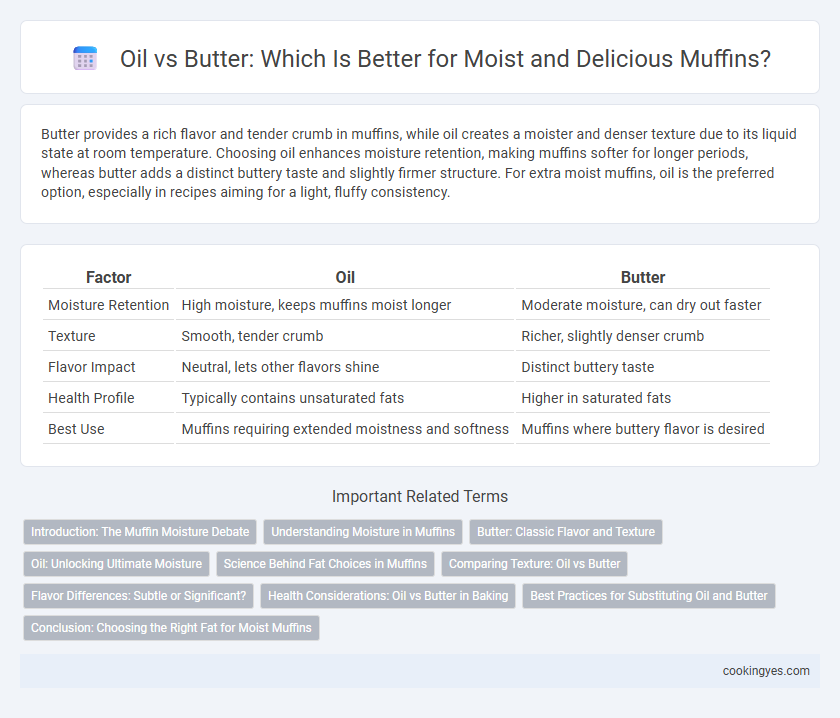Butter provides a rich flavor and tender crumb in muffins, while oil creates a moister and denser texture due to its liquid state at room temperature. Choosing oil enhances moisture retention, making muffins softer for longer periods, whereas butter adds a distinct buttery taste and slightly firmer structure. For extra moist muffins, oil is the preferred option, especially in recipes aiming for a light, fluffy consistency.
Table of Comparison
| Factor | Oil | Butter |
|---|---|---|
| Moisture Retention | High moisture, keeps muffins moist longer | Moderate moisture, can dry out faster |
| Texture | Smooth, tender crumb | Richer, slightly denser crumb |
| Flavor Impact | Neutral, lets other flavors shine | Distinct buttery taste |
| Health Profile | Typically contains unsaturated fats | Higher in saturated fats |
| Best Use | Muffins requiring extended moistness and softness | Muffins where buttery flavor is desired |
Introduction: The Muffin Moisture Debate
Oil retains moisture better than butter in muffins due to its liquid state at room temperature, resulting in a softer and more tender crumb. Butter contributes a richer flavor but can lead to a denser texture as it solidifies when cooled. Choosing between oil and butter directly impacts the muffin's moisture level and overall mouthfeel, influencing the final baking outcome.
Understanding Moisture in Muffins
Oil contributes to a moister muffin texture by coating flour proteins and inhibiting gluten formation, resulting in a tender crumb. Butter, while providing rich flavor, contains water that evaporates during baking, leading to a slightly drier muffin compared to oil-based recipes. The choice between oil and butter directly impacts muffin moisture retention and texture, with oil typically producing a softer, more moist outcome.
Butter: Classic Flavor and Texture
Butter enhances muffin moisture by providing a rich, creamy texture and classic flavor that oil cannot replicate. Its natural milk solids contribute to a tender crumb and slightly caramelized crust, creating a satisfying mouthfeel. Using butter results in moist muffins with a deeper, buttery taste favored in traditional baking.
Oil: Unlocking Ultimate Moisture
Oil enhances muffin moisture by coating flour proteins more effectively than butter, resulting in a tender and moist crumb. It remains liquid at room temperature, which helps retain moisture longer and prevents muffins from drying out quickly. Using oil in muffin recipes unlocks ultimate moisture, creating a soft texture that outperforms butter-based alternatives.
Science Behind Fat Choices in Muffins
Oil provides a higher moisture retention in muffins due to its liquid state at room temperature, which coats flour proteins and limits gluten formation, resulting in a tender crumb. Butter contains water and milk solids that evaporate during baking, contributing to a slightly drier texture but richer flavor through Maillard reactions. Selecting oil over butter enhances moistness scientifically by reducing moisture loss and creating a softer, more tender muffin crumb.
Comparing Texture: Oil vs Butter
Oil creates muffins with a moist, tender crumb due to its liquid state at room temperature, while butter produces a denser, richer texture because it solidifies as it cools. Muffins made with oil tend to have a softer, more uniform crumb, whereas those baked with butter offer a slightly flakier, more structured bite thanks to butter's fat crystals. Choosing between oil and butter directly influences the muffin's mouthfeel, moisture retention, and overall texture.
Flavor Differences: Subtle or Significant?
Butter imparts a rich, creamy flavor to muffins that enhances their overall taste with a slightly caramelized, nutty undertone. Oil, on the other hand, offers a more neutral flavor, allowing other ingredients like fruit or spices to stand out without competing. The difference in flavor between butter and oil in muffins is significant for those who savor a buttery depth, while subtle for those prioritizing moistness over taste complexity.
Health Considerations: Oil vs Butter in Baking
Oil retains more moisture in muffins, resulting in a tender crumb, while butter adds richer flavor but can create a denser texture. From a health perspective, oil generally contains unsaturated fats, which are considered heart-healthy, whereas butter is higher in saturated fat and cholesterol. Choosing oil over butter can reduce the risk of cardiovascular issues and improve overall lipid profiles in baked goods.
Best Practices for Substituting Oil and Butter
Using oil in muffins enhances moisture retention due to its liquid state at room temperature, resulting in a tender crumb. Butter provides richer flavor and slightly firmer texture but can dry out muffins if overused or melted improperly. Best practices for substituting involve replacing butter with 80% of the oil amount to maintain moisture without compromising structure, and melting butter before mixing to mimic oil's consistency.
Conclusion: Choosing the Right Fat for Moist Muffins
Oil provides superior moisture retention in muffins due to its liquid state at room temperature, resulting in a tender, moist crumb. Butter enhances flavor and creates a richer texture but can yield slightly drier muffins because it solidifies as it cools. For consistently moist muffins, selecting oil as the primary fat is optimal, especially in recipes prioritizing softness and longevity.
Oil vs Butter for muffin moisture Infographic

 cookingyes.com
cookingyes.com